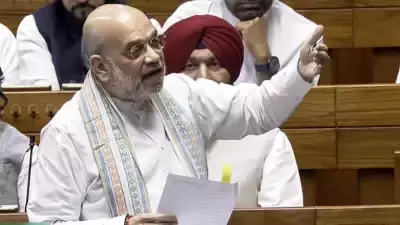"Waqf Board’s role is administrative, not religious": Amit Shah on Non-Muslim entry

Union Home Minister Amit Shah on Wednesday rejected the allegations of opposition MPs of intimidating Muslims through the Waqf Amendment Bill in the Lok Sabha, saying that, on the contrary, the opposition is scaring minorities by spreading confusion for vote bank. In the ongoing discussion on the Waqf (Amendment) Bill, 2024 in the House, Amit Shah said, I have listened closely to the discussion that is going on since noon today. I think that either innocently or for political reasons, many members have a lot of misconceptions in their minds and there has also been an attempt to spread a lot of misconceptions in the House and across the country. Some things have been put forth by the opposition members here that need clarification.
He said that 'Waqf' is an Arabic word, whose history is linked to some Hadiths. Its meaning is nowadays taken as a charitable endowment. Waqf means 'donating sacred properties in the name of Allah'. This word was first used during the time of Caliph Umar and if we understand it in today's time, then it is a donation of a property which is given by a person for religious or social welfare without the intention of taking it back. This process is called 'Waqf'.
Shah said that donation is very important, but donation can be done only of that thing which is our own. No one can donate government property, nor can anyone else's property be donated. He said that the Waqf came into existence in the country at the beginning of the Sultanate period of Delhi and during the British period, it was run under the Religious Donation Act. Later in 1890, its process was run under the Charitable Property Act, then in 1913 the Muslim Waqf Validating Act came into existence. After this, in 1954, it was changed for centralization and in 1995 Waqf Tribunal and Waqf Boards were established. He stressed that the Waqf Council and Waqf Board have come into existence since 1995.
Amit Shah said that this entire controversy is about the entry of non-Muslims in Waqf. He said that earlier there was a provision that no non-Islamic member could be in the Waqf. This makes it clear that nothing can be non-Islamic and no provision has been made to have a non-Muslim member in the management of religious institutions, nor do we want to make any such provision.
On the allegation from the opposition parties that the property of Muslims or their rights to equality will be harmed, the Home Minister said that the Waqf Board and Council were formed since 1995 and this process is only related to the administration and regulation of the property, and not to interfere in the beliefs of any religion. He also said that minorities are being intimidated by spreading this misconception so that their vote bank can be created.
Amit Shah also clarified that the work of the Waqf Board is not to conduct religious activities. Their work is only to see whether the property given for donation is being administered properly or not. He said, for whom the donation has been given, whether it is for the Islamic religion or the upliftment of the poor, whether it is being used properly or not, it is our job to see. Waqf Board has been formed under the Trust Act, where trustees are the people who will look after the functioning of this board. They can be of any religion, because their work is not to follow religion, but to run the trust according to the law.
Amit Shah said in this context that the purpose of the Waqf Board is not religious work, it is administrative work. He said that since Waqf originated from the principles of Islam, this board is run by persons who are followers of Islam. However, he clarified that the board is not religious and the trustees on it can be of any religion. The purpose of Waqf is administrative, not religious.
